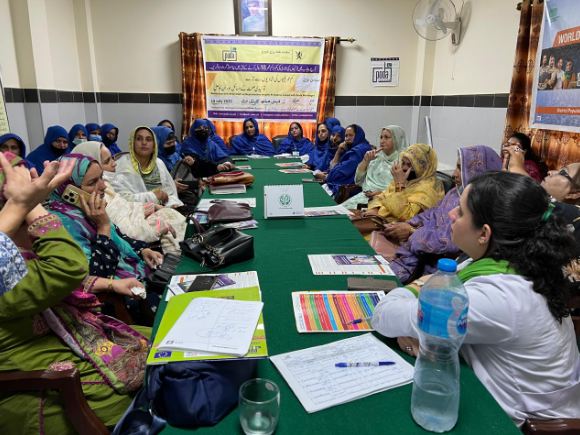MURREE, JUL 14 /DNA/ – In connection with World Population Day, Potohar Organization for Development Advocacy (PODA), in collaboration with the Family Health Clinic, THQ Murree, organized a workshop emphasizing the urgent need to end child marriage in order to empower youth to make informed decisions about their future, including when to start a family and how to determine family size.
A significant number of Lady Health Supervisors, THQ staff, and Lady Health Workers affiliated with various Basic Health Units across the district attended the workshop. The session stressed the importance of empowering both girls and boys through access to education and opportunities for meaningful employment.
World Population Day is observed annually on 11 July to raise awareness about population-related issues. The workshop was part of the 3-Year project “Reduce Early Marriages to Enhance Gender Equality,” supported by the Royal Norwegian Embassy in Islamabad. PODA is implement this project in 41 districts of Punjab.
Representing PODA, Nabeela Aslam emphasized the need to advocate for a uniform minimum legal age of marriage for girls across the country, similar to the recent legal reform implemented in the Islamabad Capital Territory. She explained that raising the legal age helps ensure girls can complete their education and acquire skills for a dignified life. She highlighted the contradiction that, while women are central to bringing future generations into the world, they are frequently denied access to accurate information and essential services related to their sexual and reproductive health.
She also stressed the importance of better menstrual hygiene management, hydration, and personal cleanliness during menstruation to prevent serious health issues such as urinary tract infections. During the workshop, it was found that the hemoglobin levels of participants varied significantly—eight to ten had levels below 9, around ten had levels above 10, and a few had levels above 12. These findings highlighted and emphasized the need for participants to prioritize their own health.
The participants discussed how many women and girls lack access to the knowledge and resources needed to protect their reproductive health, including basic menstrual hygiene. In some cases, girls stop drinking water during school or work hours to avoid using unhygienic toilets, leading to dehydration and an increased risk of urinary tract infections. If left untreated, these infections can result in serious health complications.
Dr. Maryam Ali, Incharge of the Family Health Clinic, Murree highlighted the importance of equipping the younger generation with knowledge, resources, and opportunities to lead informed and practical lives. She noted that girls who marry early face higher risks of early pregnancies, complications such as obstetric fistulas, and elevated maternal and neonatal mortality.
The participants collectively expressed the view that Pakistan can only achieve sustainable progress through an empowered younger generation. However, they noted with concern that access to essential services and opportunities is rapidly shrinking due to the country’s high population growth rate. If current trends continue, Pakistan is expected to become the fourth most populous country in the world by 2030.
The workshop also addressed the impact of internal migration on local social dynamics. Participants shared that migration from Khyber Pakhtunkhwa to Murree has brought in communities with more conservative views, where child marriage is more common. Among the 30 participants, seven to eight reported knowing underage girls who had been married in their communities. Poverty was identified as one of the key drivers of this practice.
All participants agreed that poverty, limited access to education, and gender inequality remain major contributors to child marriage in Pakistan. The burden falls disproportionately on girls, who are often denied education, economic opportunities, and the ability to make autonomous decisions about their lives.
To strengthen future collaboration on these critical issues, a letter of coordination between PODA and THQ Murree was signed, marking a step forward in promoting the health and well-being of women and girls in the Murree district.
Following the workshop, the participants held a brief awareness walk at GPO Chowk, Murree to engage the public and highlight the harmful impact of child marriage on girls’ health, education, and overall well-being. The walk also aimed to advocate for balanced families in accordance with available resources, emphasizing the importance of planning and informed decision-making for a healthier and more sustainable future.

















